Pergolas have been used for centuries to add a touch of elegance and style to outdoor spaces. As they offer both shade and ventilation, pergolas are the perfect choice for those who want to enjoy the outdoors without being exposed to excessive heat or humidity.
Louvers – adjustable blades that can be opened and closed depending on the weather conditions – are a great way to customize your pergola’s shade and ventilation, while also adding an aesthetic touch.
This article will look at the benefits of installing a pergola featuring louvers, as well as tips on how to choose them, installation process, maintenance requirements, advantages, and cost considerations.
Overview of Pergolas
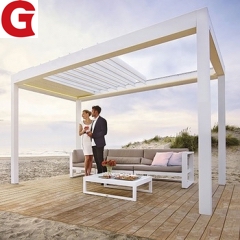
Installing a pergola can provide an optimal balance between sunshine and shade, as well as improved air circulation. Pergolas are traditionally designed structures with open roofs that are made of columns and beams supporting lattice work or cross rafters. They are often used in outdoor areas such as pathways, patios, or decks to provide solar protection in the form of partial shade from direct sunlight.
With custom designs, pergolas can also be built to feature louvers which help to control ventilation. This can allow homeowners to adjust the amount of airflow within their outdoor spaces by opening and closing the louvers accordingly.
Customization is one of the main advantages of incorporating louvers into a pergola design. Homeowners can choose from a variety of materials and colors depending on their budget and preferences for aesthetic appeal. Louvers come in different shapes including square or rectangle designs, round, oval, or fan shaped pieces that can be arranged side-by-side or staggered for added visual interest and architectural diversity. Additionally, they offer flexibility when it comes to controlling light levels and temperature since homeowners have the option to open them wider during hot days while keeping them closed when temperatures drop during cooler months.
The durability factor should not be overlooked either since most louver systems are manufactured using aluminum which ensures years of reliable use even under extreme weather conditions without requiring much maintenance at all; these systems also resist corrosion due to harsh environmental elements such as saltwater exposure which makes them ideal for coastal areas where humidity levels tend to be higher than other regions. Furthermore, many louver manufacturers offer warranties for their products so homeowners can rest assured that their investment will remain protected against any potential damages caused by wear and tear over time.
In addition to providing customizable shade solutions through its louvered system, installing a pergola featuring louvers offers an array of practical benefits ranging from enhanced privacy through greater sound dampening effects compared to traditional roofing materials like shingles or metal sheeting products; this allows homeowners more control over the amount of noise entering into their backyard space while still enjoying fresh air circulation throughout the day without having unwanted guests peeking into their private area uninvitedly .
As such, it’s easy to see why adding a pergola featuring louvers is becoming increasingly popular among modern homeowners looking for ways to customize their shade and ventilation needs in one convenient solution package.
Benefits of a Pergola Featuring Louvers
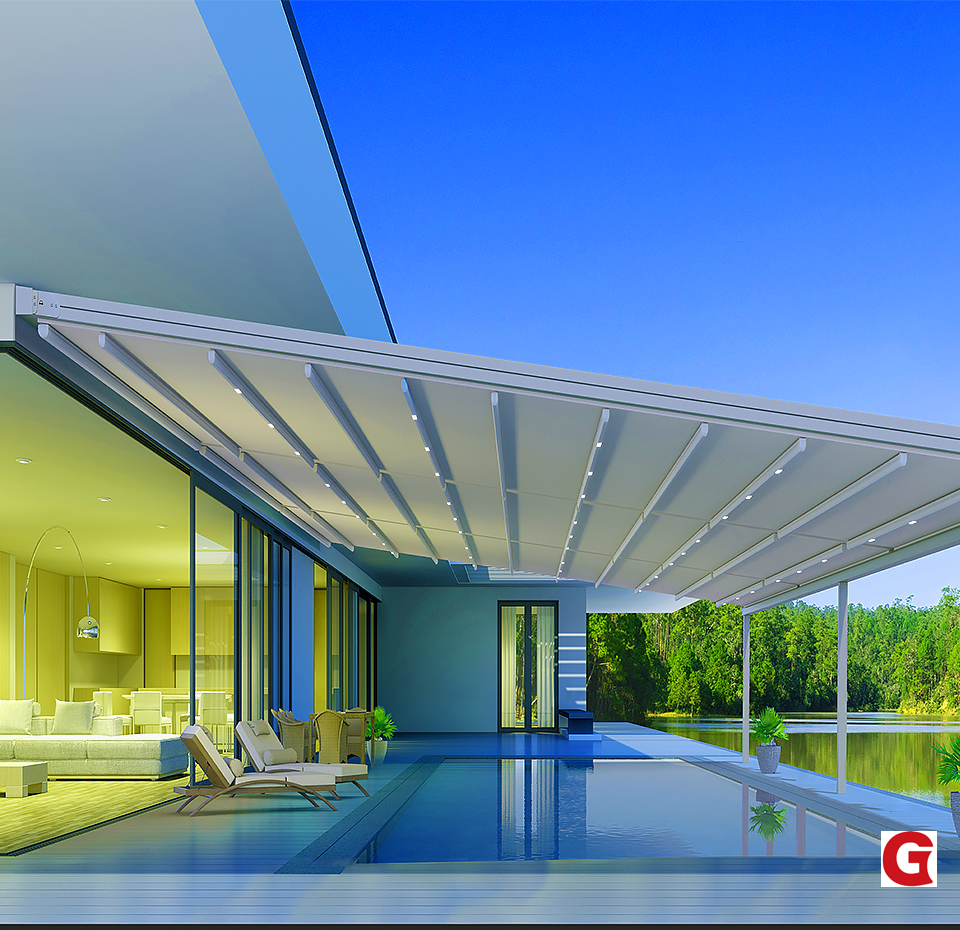
By enabling users to control the amount of sunlight and air flow, a pergola with louvers offers multiple benefits to those seeking outdoor comfort. From adjustable design options for precise light and ventilation control to improved energy efficiency, these structures provide a range of advantages:
- Flexible Design – Louvered pergolas are designed to be adjustable, allowing users to adjust the angle of the slats in order to create more or less shade and ventilation. This enables them to customize their outdoor space based on the weather conditions or time of day without having to replace any parts.
- Increased Air Flow – By adjusting the louvers, users can increase air circulation in their outdoor area, which helps keep it cool during hot days as well as reducing humidity levels. Additionally, this can help reduce airborne allergens such as pollen and dust particles from entering the area.
- Energy Efficiency – A louvered pergola is also an excellent choice for those looking for an energy-efficient option as it helps block out direct sunlight while still allowing some natural light into the area; this can help save money on cooling costs by keeping temperatures lower during hot summer days.
The combination of flexible design options and increased energy efficiency make a louvered pergola an ideal solution for anyone wanting greater control over their outdoor environment without sacrificing comfort or style. The next step is exploring what types of louvers are available and how they can best meet one’s needs.
Types of Louvers
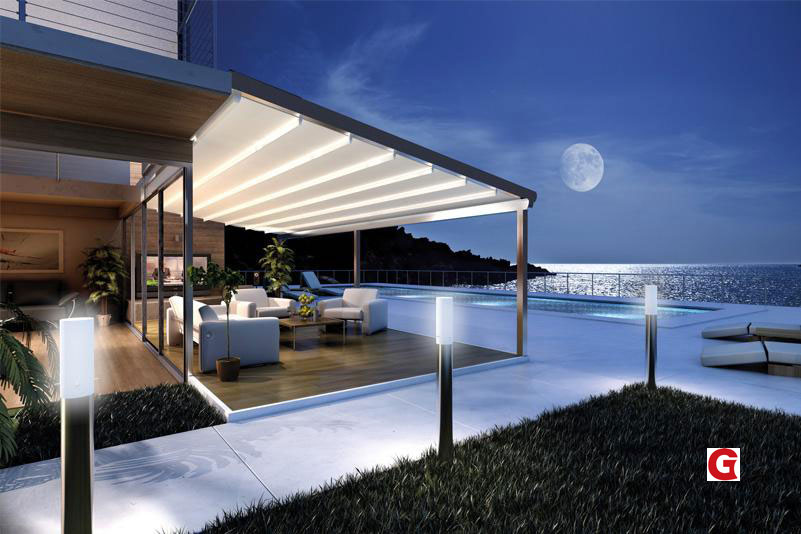
Various types of louvers are available to enable users to adjust the amount of sunlight and air flow in their outdoor area. Louver materials range from aluminum, vinyl, wood or composite. Aluminum is an excellent choice for its strength and durability, while vinyl is a lightweight yet strong material that provides good insulation. Wood has the classic look but requires more maintenance than other materials. Composite blends several materials for superior strength with low maintenance requirements.
Motorized louvers provide convenience as well as adjustable levels of shade and ventilation. They come in a variety of sizes and shapes, making it easy to find one that fits your needs perfectly. Some motorized louvers even have a built-in timer so that you can set them to open or close at specific times during the day or night.
When selecting the right type of louver for your pergola, consider factors such as the size of your outdoor space and how much sun exposure you want it to get throughout the day. You should also consider whether you want manual or motorized operation, and if so, what type of controls do you need?
Finally, think about any special features like integrated lighting systems or wind sensors that might be required depending on where your pergola is located geographically speaking.
By taking all these factors into consideration when choosing louver types for your pergola, you can ensure that it meets your desired level of shade and ventilation while providing an aesthetically pleasing addition to your outdoor space. With careful selection and proper installation techniques, you can enjoy years of enjoyment with your custom-built pergola featuring louvers!
Tips for Choosing the Right Louvers
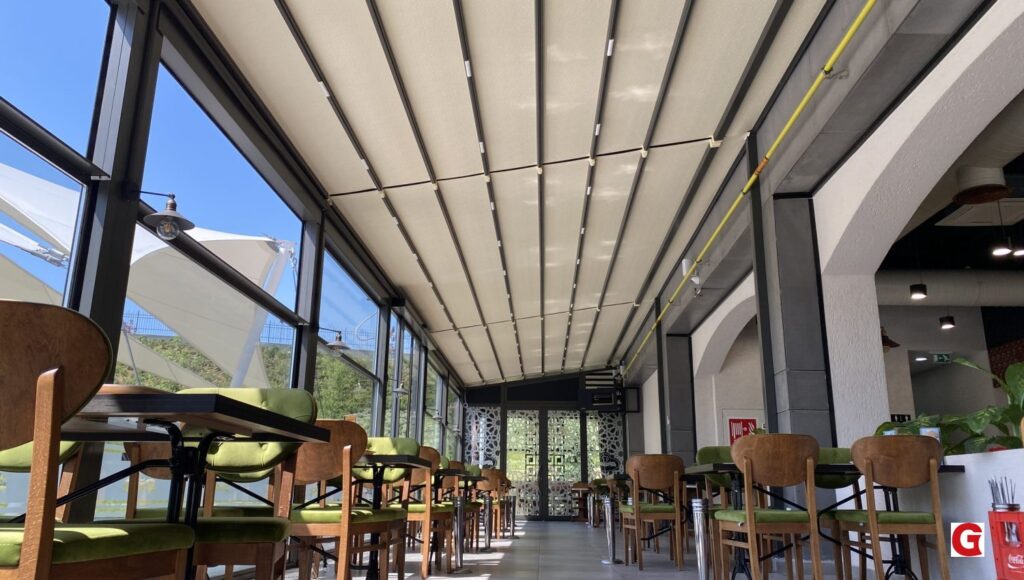
When selecting the appropriate type of louver for an outdoor area, it is important to consider factors such as size, sun exposure and operating mechanism, in order to create a tranquil ambiance.
Louvers can be adjusted to provide more or less shade and ventilation depending on the needs of the user. They come in a variety of styles and sizes that can fit almost any space and are designed with energy efficiency in mind. In addition, they offer a wide range of design options so that homeowners can customize their own louvered pergola according to their own personal preferences.
The size of the louver should be chosen based on how much sunlight will be hitting it throughout the day. A larger louver will block out more sun whereas a smaller one won’t offer as much protection from direct sunlight but still provides adequate ventilation.
Depending on the climate, homeowners should also consider what kind of operating mechanisms they prefer for their louvers – manual or motorized? Manual louvers require no electricity but need to be adjusted by hand while motorized ones allow automated control via remote or smartphone app.
Another factor to keep in mind when choosing louvers is material selection; most popularly aluminum as it is both lightweight yet strong and has excellent durability when exposed to outdoor elements like rain or intense heat over extended periods of time. Homeowners may also opt for wood if they’re looking for something with more character and charm but bear in mind that this material requires more maintenance than metal options do over time so make sure you choose wisely!
Finally, there are a few other considerations that should be taken into account before making your decision such as cost versus value ratio; higher quality materials tend to last longer despite being pricier upfront so it’s worth considering whether investing in better-quality louvers would be worthwhile long-term investment overall.
Taking all these points into consideration will ensure you find just the right type of louver for your outdoor space; ready now for installation process and use!
Installation Process
Installing louvers requires careful consideration and attention to detail in order to ensure a successful outcome. To get the most out of your louver system, it’s important to plan ahead and understand the nuances of installation:
- Start by building a strong support system that is capable of withstanding weather elements such as wind, rain, snow, ice and extreme temperatures.
- Carefully measure each louver for accuracy before you install it. It’s essential that the louvers fit properly so they can provide adequate ventilation and shade.
- Weatherproofing is also critical for protecting your pergola from the outdoor elements; use sealants or waterproofing sprays on all exposed surfaces to create a watertight barrier between your pergola and its surroundings.
With these steps taken into account, you’ll be able to achieve a secure louver installation that meets all your needs for shade and ventilation. The next step is understanding maintenance requirements – which will vary depending on the type of materials used – in order to preserve the longevity of your custom louver setup.
Maintenance Requirements
Once the installation of a pergola featuring louvers is complete, it is important to be aware of the necessary maintenance requirements in order to ensure that it maintains its energy efficiency and aesthetic appeal.
To begin, the louvers should be inspected regularly for any damage or wear and tear. If any issues are identified, they should be addressed immediately before they become more serious. Additionally, as with other outdoor structures, regular cleaning is essential to remove dirt, debris or bird droppings that can accumulate over time.
It is also important to remember that the louvers will need periodic lubrication in order to keep them functioning properly and smoothly. This may involve spraying an appropriate lubricant onto the louver blades every few months to prevent them from sticking and ensure they open and close as intended. Moreover, if any parts need replacing due to age or wear-and-tear, original replacement parts should be used whenever possible – generic parts may not fit correctly and could cause further problems down the line.
The pergola frame itself may require occasional painting or staining depending on how exposed it is to wind and rain throughout the year. This will help maintain its structural integrity by preventing rusting or corrosion of metal components such as screws which can weaken joints over time if left untreated. It’s also worth noting that some pergolas feature waterproof covers which will need replacing periodically depending on their condition – this will help avoid water damage which can occur when heavy rains fall if there isn’t adequate protection overhead.
Finally, taking all these steps into consideration helps guarantee your pergola featuring louvers remains an attractive addition to your home for years to come while continuing its energy efficient functions – both key advantages of installing a pergola featuring louvers in the first place. Knowing what needs done ahead of time makes it easier than ever before for homeowners looking for a dependable shade solution that adds style and comfort through customizable features like adjustable blades without having to sacrifice quality for convenience.
Advantages of Installing a Pergola Featuring Louvers
Installing a pergola featuring louvers provides numerous advantages, such as offering customizable solutions for shade and ventilation while providing a sophisticated aesthetic. The main benefits of installing a pergola with louvers are:
- Shade Control – Louvered pergolas provide adjustable shade control with the option to open and close the louvers depending on the amount of sun desired.
- Sun Protection – As well as creating shade, louvered pergolas also offer protection from UV rays by blocking direct sunlight when closed. This makes them an ideal choice for those looking for outdoor areas that remain cool even in bright light conditions.
- Aesthetics – Louvered pergolas add an extra touch of sophistication to any outdoor area, making them perfect for those wanting to create a stylish yet functional space.
The installation of a louvered pergola offers many practical and aesthetic advantages, making it a great choice for anyone looking to customize their outdoor space’s shade and ventilation needs without compromising on style or comfort. Additionally, this type of structure can be installed at minimal cost compared to other types of patio covers or shades, making it an attractive option both financially and aesthetically.
Cost of Installing a Pergola Featuring Louvers
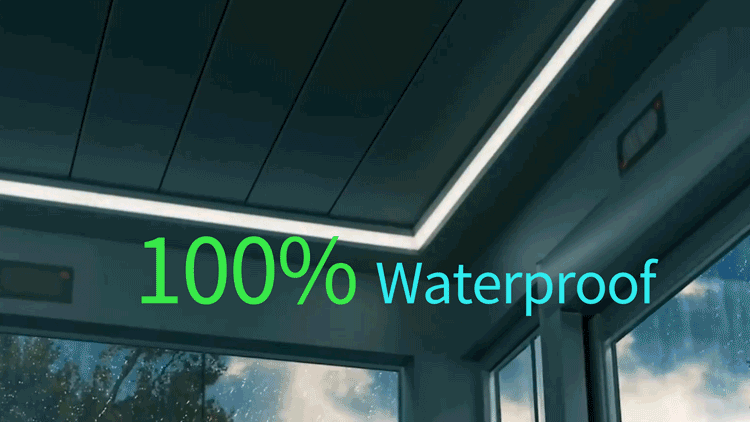
The cost of installing a pergola with adjustable louvers can be an attractive option for those looking to create an outdoor space that offers customizable shade and ventilation solutions. The installation cost of these features depend on the size of the structure, the type of materials chosen, and any additional features required. Generally, wooden pergolas with louvers tend to be more expensive than aluminum structures due to their higher labor costs. Additionally, customizing options such as motorized or remote-controlled louver systems can add significantly to the overall price tag.
However, it is important to keep in mind that purchasing a pergola featuring louvers can save money in the long run by reducing energy bills due to increased shade and ventilation control throughout all seasons. Even if the initial investment is more costly than traditional alternatives, homeowners may benefit from lower cooling costs in summer months and reduced heating expenses during winter months when compared to open air patios or decks without adjustable shading systems.
When it comes time for installation, property owners should take into consideration factors such as local weather conditions which may affect performance over time. Reputable professionals should be consulted in order to ensure proper setup and maintenance instructions are followed during installation. Furthermore, various accessories such as mesh curtains or side shades can provide additional customizing options while also keeping long-term costs low through reduced energy consumption needs.
Pergolas featuring louvers offer homeowners a wide range of customizable options for both shade and ventilation control over an outdoor living space. While there is an initial investment associated with this type of feature, careful evaluation of installation costs alongside potential savings from lowered energy bills could lead to greater savings over time as well as enhanced comfort throughout all seasons.
Frequently Asked Questions
What type of materials can be used to construct a pergola featuring louvers?
The construction of a pergola featuring louvers can be created using a variety of materials, including timber, aluminum and polycarbonate.
Timber is the most popular choice due to its natural look, but it requires regular maintenance to protect it from the elements.
Aluminum is lightweight and durable, yet still allows adequate light penetration for shade control.
Polycarbonate offers both an aesthetic appeal as well as superior sun protection with its louver design that allows for ventilation while blocking out UV rays.
Depending on your needs and budget, there are plenty of options available when it comes to constructing a pergola featuring louvers.
Are there any special tools needed for installation?
Installing a pergola featuring louvers requires special tools, such as an electric drill, saws, and other multi-purpose tools.
This type of construction is energy efficient when done correctly and is recommended for those with experience in carpentry.
Special attention should be given to the use of the correct materials that will ensure a secure installation and provide years of reliable use.
With the right combination of tools and materials, the experienced contractor can customize their shade and ventilation needs while also achieving a sense of belonging by creating something useful for themselves or others.
How long does it typically take to install a pergola featuring louvers?
Installing a pergola featuring louvers can be an efficient and cost-effective home improvement project. Depending on the size of the area, it typically takes anywhere from 3 to 6 hours to complete the installation.
It is important for homeowners to consider wind resistance and solar power when selecting their louvered pergola system, as these two factors will affect how long the installation process will take.
Having an experienced installer or contractor is also important in order to ensure that the job is done correctly and efficiently.
What kind of warranty or guarantee comes with a pergola featuring louvers?
When it comes to investing in a premium pergola featuring louvers, cost benefits and long-term care are paramount.
As such, many manufacturers offer an extensive warranty or guarantee for their products, designed to give consumers peace of mind that their investment is protected for years to come.
With warranties ranging from 10 years up to lifetime guarantees on some components, customers can rest assured that they have the security they need should any problems arise.
These warranties are also often transferable between owners so that the structure’s longevity is not compromised when it changes hands.
Are there any potential safety or health concerns when installing a pergola featuring louvers?
When installing a pergola featuring louvers, there are potential safety and health concerns to consider. These include UV exposure from the sun, which can be mitigated by using weatherproofing measures such as applying a protective coating or installing shade cloth.
Additionally, the louvers may need to be secured with appropriate hardware to prevent them from becoming loose and presenting a hazard. It is also important to check for any restrictions or regulations related to building codes in your area that could affect the installation of your pergola.
With proper planning and consideration of these safety and health issues, you can ensure the successful installation of your new pergola featuring louvers.
Conclusion
The pergola featuring louvers is an ideal choice for homeowners who are looking to customize their outdoor space. It provides customizable shade and ventilation options that can be adjusted to suit individual needs.
Louvers come in a variety of shapes, sizes, and materials so it is important to choose the right ones for your specific situation. Installing a pergola with louvers requires some technical knowledge but once completed, they provide a seamless transition from indoors to outdoors.
Maintenance requirements are minimal, providing many years of enjoyment like a breath of fresh air compared to traditional outdoor structures. Investing in a pergola featuring louvers will bring added value and beauty to any backyard oasis while providing customizable solutions for shading and ventilation needs.